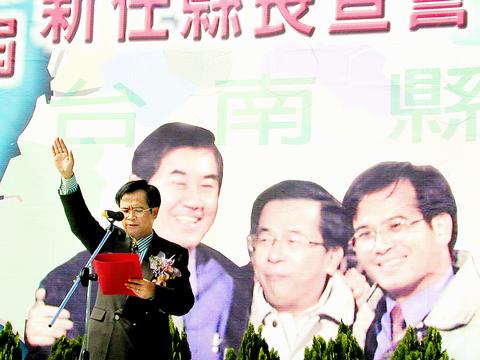The 23 county commissioners and city mayors elected in the Dec. 1 elections took their oaths of office yesterday. And in a sign of difficult times, most promised to boost their local economies.
The handover ceremonies were held under the auspices of the Ministry of the Interior in the requisite counties and cities across the country.
Taoyuan County's new commissioner, Chu Li-lun (朱立倫), said that he would deal with the top three problems he said Taoyuan residents are most concerned about: traffic, security and financial difficulties.

PHOTO: CHEN CHUN-SHENG, TAIPEI TIMES
He said that the Taoyuan County Government will bring more bus-inesses into the county and promised to shorten the application process to obtain permission to build plants in the county.
The new DPP commissioner in Chiayi County, Chen Ming-wen(陳明文), said that since Chiayi is primarily an agricultural region, his government will face tough challenges upgrading the sector to deal with Taiwan's entry into the WTO. He added, however, that "Crisis also means opportunity. I believe that if we cooperate with each other, we will meet the challenges."
The incoming DPP commissioner of Tainan County, Su Huan-chih (蘇煥智), made the same promise in his mainly agricultural county.
Su also promised to establish a biotech park and, like his predecessor Chen Tang-shan (陳唐山), "to bring business from all over Taiwan" into the county.
In Taipei County, re-elected DPP commissioner Su Tseng-chang (蘇貞昌) promised to improve the county's investment environment.
"I will spend every penny appropriately, strengthen the government's administrative efficiency, create more job opportunities and push for greater cooperation between the central and local governments," Su said.
In Miaoli County, independent Commissioner Fu Hseuh-peng (傅學鵬) proposed four goals for Miaoli, including building a university and developing technology, tourism and welfare.
In Hsinchu City, KMT Mayor Lin Cheng-tse (林政則) emphasized his social welfare policy, promising an increase in subsidies for the elderly and women's maternity allowances.
In Taichung City, outgoing mayor Chang Wen-ying (張溫鷹) said she hopes the newly elected mayor, Jason Hu, will help Taichung overtake Kaohsiung and Taipei to become Taiwan's "top city."
The DPP, which controlled 12 districts in 1997, won just nine city and county districts this time around. The KMT, which previously controlled eight counties, was victorious in nine districts.
Independent candidates and the People First Party captured two districts each, while the New Party took only Kinmen County.
Local heads have complained bitterly about their financial plight since the election. Many local government are heavily reliant on loans.
Premier Chang Chun-hsiung (張俊雄) promised at a meeting with all of the newly elected leaders last Sunday that the Cabinet will adopt measures to help them cope with their fiscal woes.
Emotional incidents, however, marred the ceremonies in Taoyuan, Hsinchu and Chiayi.
In Chiayi County, outgoing commissioner Lee Ya-ching (李雅景) failed to attend the handover ceremony for "personal reasons." In Taoyuan County, a county councilor heckled outgoing commissioner Hsu Ying-shen (許應深) during his speech and in Hsinchu County, the newly elected commissioner's supporters implored the outgoing commissioner, Lin Kuang-hua (林光華), to end his speech after he had spoken for over an hour.

INVESTIGATION: The case is the latest instance of a DPP figure being implicated in an espionage network accused of allegedly leaking information to Chinese intelligence Democratic Progressive Party (DPP) member Ho Jen-chieh (何仁傑) was detained and held incommunicado yesterday on suspicion of spying for China during his tenure as assistant to then-minister of foreign affairs Joseph Wu (吳釗燮). The Taipei District Prosecutors’ Office said Ho was implicated during its investigation into alleged spying activities by former Presidential Office consultant Wu Shang-yu (吳尚雨). Prosecutors said there is reason to believe Ho breached the National Security Act (國家安全法) by leaking classified Ministry of Foreign Affairs information to Chinese intelligence. Following interrogation, prosecutors petitioned the Taipei District Court to detain Ho, citing concerns over potential collusion or tampering of evidence. The

‘FORM OF PROTEST’: The German Institute Taipei said it was ‘shocked’ to see Nazi symbolism used in connection with political aims as it condemned the incident Sung Chien-liang (宋建樑), who led efforts to recall Democratic Progressive Party (DPP) Legislator Lee Kun-cheng (李坤城), was released on bail of NT$80,000 yesterday amid an outcry over a Nazi armband he wore to questioning the night before. Sung arrived at the New Taipei City District Prosecutors’ Office for questioning in a recall petition forgery case on Tuesday night wearing a red armband bearing a swastika, carrying a copy of Adolf Hitler’s Mein Kampf and giving a Nazi salute. Sung left the building at 1:15am without the armband and apparently covering the book with a coat. This is a serious international scandal and Chinese

Seventy percent of middle and elementary schools now conduct English classes entirely in English, the Ministry of Education said, as it encourages schools nationwide to adopt this practice Minister of Education (MOE) Cheng Ying-yao (鄭英耀) is scheduled to present a report on the government’s bilingual education policy to the Legislative Yuan’s Education and Culture Committee today. The report would outline strategies aimed at expanding access to education, reducing regional disparities and improving talent cultivation. Implementation of bilingual education policies has varied across local governments, occasionally drawing public criticism. For example, some schools have required teachers of non-English subjects to pass English proficiency

TRADE: The premier pledged safeguards on ‘Made in Taiwan’ labeling, anti-dumping measures and stricter export controls to strengthen its position in trade talks Products labeled “made in Taiwan” must be genuinely made in Taiwan, Premier Cho Jung-tai (卓榮泰) said yesterday, vowing to enforce strict safeguards against “origin laundering” and initiate anti-dumping investigations to prevent China dumping its products in Taiwan. Cho made the remarks in a discussion session with representatives from industries in Kaohsiung. In response to the US government’s recent announcement of “reciprocal” tariffs on its trading partners, President William Lai (賴清德) and Cho last week began a series of consultations with industry leaders nationwide to gather feedback and address concerns. Taiwanese and US officials held a videoconference on Friday evening to discuss the